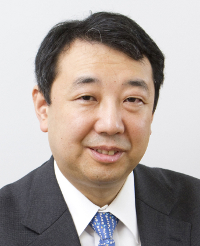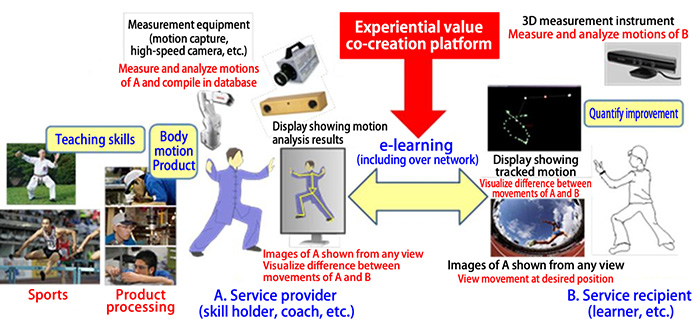Research Projects Selected in FY2013
< Solution-Oriented Service Science Research, Type A >
Empirical Research on Co-creative Skill E-learning Service with Visualization of Experience Value

[] Project Leader
Hajime ASAMA
Professor, Department of Precision Engineering, School of Engineering, The University of Tokyo
[] Targets
- Clarify the elements that constitute experiential value enhancing skills education service
- Establish methodologies for quantifying and visualizing experiential value in skills education
- Develop tools that can analyze co-creation mechanisms based on the experiential value of provider and recipient fluctuating over time and, through actual use, clarify co-creation mechanisms in skills education practice
- Try out the tools in actual education, extract the essence of co-creation mechanisms appropriate to individual cases, and develop methods for teaching in skills education that will produce co-creation
[] Approach
- Developing action analysis and presentation techniques: Take 3D measurements of the movements of the skill holder and learner, and analyze those actions. Visualize the motions, displaying them as 3D images that can be viewed from any perspective
- Compiling a skills database: Extract features based on analyzing the actions of skill holders, and conduct interviews to create formal knowledge from implicit knowledge
- Developing tools for evaluating satisfaction: Estimate by combining psychological assessment and physiological measurements
- Quantifying experiential value: Analyze changes in the correlation between satisfaction and actions/behavior
In the manufacturing and other industries, how to pass on the skills of skilled workers has increasingly become an issue in recent years. In skills education, including that for sports and music, normally the learner and instructor share the same time and space, making the education process subject to constraints on place, time, and number of people. In the case of e-learning, considered to be one solution to those constraints, it is difficult to show 3D motions to each other, and to communicate intentions or satisfaction smoothly in the same space. As a result, neither the learner nor the teacher is able to obtain higher experiential value.
This project applies to professional skills from the manufacturing craft to nursing care, as well as to recreational skills in the area of sports improvement. Our aim is to create a new e-learning system in which skills can be taught and learned even without sharing the same time and space, and in which the learner and instructor co-creatively heighten their experiential value.
The development will include methodology for measuring differences in physical movement between the instructor and learner and for extracting skills (know-how), as well as methodology for quantitative evaluation of learner accomplishment and satisfaction. By integrating these methodologies into the e-learning system, an experiential value co-creation platform is to be realized enabling feedback also to the instructor. Not only will skills education be made more efficient as a result, but the approach will lead to greater satisfaction of both instructor and learner and make it possible to raise service quality.

This material belongs to the folloeing:
Project:Empirical Research on Co-creative Skill E-learning Service with Visualization of Experience Value
Project Leader:Hajime ASAMA




